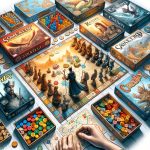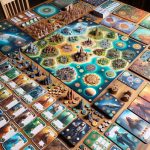If you’re looking for a fun and entertaining way to spend quality time with family and friends, non-strategy board games are the perfect choice. These types of games offer a lighthearted and enjoyable experience without the intense planning and strategizing often found in other board games. Whether you’re playing with kids, adults, or a mixed group, there are plenty of non-strategy board games to choose from that cater to various interests and preferences.
Non-strategy board games are designed for players to have fun without the pressure of making complex decisions or outsmarting their opponents. Instead, these games focus on elements such as luck, teamwork, creativity, and quick thinking. With simple rules and easy gameplay, non-strategy board games allow for a more relaxed and enjoyable social experience, making them a popular choice for game nights and gatherings.
In this article, we’ll explore the appeal of non-strategy board games, popular options for families and adults, their evolution in the gaming industry, how they can improve cognitive skills, and what the future holds for these entertaining games. Whether you’re an avid board game enthusiast or new to the world of tabletop gaming, there’s something for everyone when it comes to non-strategy board games.
So grab your dice, cards, or tokens as we dive into the wonderful world of casual gaming.
The Appeal of Non-Strategy Board Games
Non-strategy board games are a popular choice for many people because they offer a different kind of gaming experience. Instead of focusing on complex rules and strategic thinking, non-strategy board games prioritize fun and social interaction. These games can be enjoyed by people of all ages, making them a great option for families, friends, and even parties.
The appeal of non-strategy board games lies in their simplicity and accessibility. Many of these games have easy-to-understand rules, making them perfect for casual gamers or those who are new to the world of board games. Whether it’s a quick game of chance or a hilarious party game, non-strategy board games provide an opportunity for players to relax, have fun, and connect with others.
Some popular examples of non-strategy board games include:
- Uno
- Twister
- Jenga
- Pictionary
- Charades
These games are known for their simplicity and ability to bring people together for a good time without the pressure of competitive strategy. Whether it’s a family game night or an evening with friends, non-strategy board games can create lasting memories and laughs for everyone involved.
Popular Non-Strategy Board Games for Families
When it comes to board games, families often look for options that everyone can enjoy, regardless of age or skill level. Non-strategy board games are a great choice for family game night as they emphasize fun and interaction over complex decision-making and strategic planning. Here are some popular non-strategy board games that are perfect for families to enjoy together:
–
- Scrabble Junior: This version of the classic word game is designed for kids aged 5 and up, providing a fun way for young children to build their vocabulary and spelling skills while playing with the whole family.
- Candy Land: This colorful and engaging game is ideal for young children, as it requires no reading skills and is based purely on luck, making it accessible to even the youngest players.
- Twister: While not a traditional board game, Twister is a beloved classic that gets the whole family moving and laughing as they twist and contort their bodies to reach the colored spots on the mat.
These non-strategy board games offer a mix of entertainment, education, and physical activity, making them perfect choices for families looking to spend quality time together.
Families may also enjoy playing:
–
- Apples to Apples: This hilarious party game challenges players to match word cards with descriptive prompt cards, resulting in funny and unexpected comparisons that will have everyone laughing.
- Pictionary: A drawing and guessing game where players take turns drawing pictures based on given prompts while their team tries to guess what they’re depicting.
- Uno: A simple yet addictive card game that combines luck and strategy as players race to be the first one to get rid of all their cards.
By choosing non-strategy board games that emphasize social interaction, creativity, and chance over complex rules or competitive gameplay, families can create memorable experiences together without anyone feeling left out or overwhelmed by complicated strategies.
Non-Strategy Board Games for Adults
When it comes to non-strategy board games for adults, there is a wide variety of options to choose from that cater to different interests and preferences. These games are designed to provide entertainment and social interaction without the need for complex strategies or deep thinking, making them perfect for casual gatherings or game nights.
Many adults enjoy non-strategy board games as a way to unwind and have fun with friends or family members without the pressure of competitive gameplay.
One popular category of non-strategy board games for adults is party games, which are specifically designed to create laughter and enjoyment among players. Examples of these games include Codenames, Telestrations, and Wits & Wagers. These games often rely on humor, creativity, and quick thinking rather than strategic planning, making them ideal for adult social gatherings or parties.
In addition to party games, there are also non-strategy board games that cater to more mature themes and content, such as trivia games, word games, and storytelling-based games. These types of board games can be enjoyed by adults who appreciate intellectual challenges or engaging narratives without the need for strategic gameplay. Examples of these games include Trivial Pursuit, Scrabble, and Dixit.
The Evolution of Non-Strategy Board Games
Non-Strategy Board Games have come a long way since their inception, evolving from simple games of chance to more complex and engaging options. Initially, non-strategy board games were based solely on luck and had little decision-making involved. However, over time, these games have become more intricate, incorporating elements of strategy, social interaction, and creativity. This evolution has made non-strategy board games more appealing to a wider range of players.
One example of the evolution of non-strategy board games is the incorporation of storytelling and role-playing elements into traditional luck-based games. Games like Dixit and Once Upon a Time require players to use their creativity and imagination to create stories based on the cards they draw, adding an exciting dimension to the gameplay.
Additionally, modern non-strategy board games have also seen a shift towards incorporating popular themes such as fantasy, science fiction, and pop culture references, making them more relatable to players of all ages.
Another aspect of the evolution of non-strategy board games is their adaptation into digital formats. Many classic non-strategy board games like Scrabble and Monopoly are now available as mobile apps or online versions, allowing players to enjoy these timeless games in a convenient and accessible way. This transition into the digital realm has opened up new possibilities for non-strategy board games, reaching a broader audience and providing innovative ways to play.
| Evolution Aspect | Description |
|---|---|
| Incorporation of storytelling | Games like Dixit and Once Upon A Time require players’ creativity. |
| Adaptation into digital formats | Classic non-strategy board games are now available as mobile apps or online versions. |
Non-Strategy Board Games for Parties and Social Gatherings
Introduction to Non-Strategy Board Games for Parties and Social Gatherings
Non-strategy board games are not only limited to family game nights or casual gatherings at home. They also make for a great addition to parties and social events, providing entertainment and fostering a sense of camaraderie among the participants. These types of board games are designed to be fast-paced, easy to learn, and promote interaction among players.
Popular Non-Strategy Board Games for Parties
Games like Codenames, Telestrations, and Pictionary are perfect examples of non-strategy board games that are ideal for parties and social gatherings. These games encourage laughter, creativity, and teamwork as players work together in teams or pairs to achieve a common goal. The emphasis is on fun rather than strategy, making them perfect for livening up any social event.
Non-Strategy Board Games as Icebreakers
One of the main appeals of non-strategy board games for parties and social gatherings is their ability to serve as icebreakers. These games can help break the initial tension among guests who may not know each other very well by providing a shared activity that encourages conversation and collaboration. The light-hearted nature of non-strategy board games makes them an excellent tool for bringing people together in a relaxed and enjoyable setting.
How Non-Strategy Board Games Can Improve Cognitive Skills
Problem Solving and Critical Thinking
Non-strategy board games, such as Scrabble, can help improve cognitive skills by fostering problem-solving and critical thinking. Players are required to think strategically about their moves and consider various possibilities before making a decision. This type of mental exercise can enhance cognitive functions and improve the ability to analyze situations.
Memory and Concentration
Board games like Memory Match or Simon Says can also contribute to the improvement of cognitive skills, particularly memory and concentration. These games require players to remember patterns, sequences, or specific information within a certain timeframe. By consistently engaging in these types of activities, individuals can enhance their memory retention and focus.
Social Skills and Communication
Aside from individual cognitive development, non-strategy board games also provide opportunities for social interaction and communication skills. Games such as Pictionary or Charades encourage players to convey messages through different mediums without using words. These types of activities can help individuals practice effective communication, interpretation of nonverbal cues, and understanding the perspectives of others.
The Future of Non-Strategy Board Games in the Gaming Industry
In conclusion, non-strategy board games have carved out a significant niche in the gaming industry and continue to captivate players of all ages. As the demand for these games grows, manufacturers are continually innovating to offer new and exciting options for both families and adult players. The future of non-strategy board games looks promising, with a wide range of options available to cater to different preferences and interests.
One of the reasons behind the enduring popularity of non-strategy board games is their universal appeal. These games provide an opportunity for social interaction and bonding, making them perfect for family gatherings and social events. Additionally, the diverse themes and gameplay mechanics ensure that there is something for everyone, from lighthearted party games to more complex options for serious gamers.
As the gaming industry continues to evolve, non-strategy board games are likely to play an increasingly important role. With advancements in technology, these traditional games are also adapting to offer digital versions and online play, reaching a wider audience than ever before. Overall, the future of non-strategy board games is bright, with endless possibilities for growth and innovation in this beloved game category.
Frequently Asked Questions
What Are the Four Categories of Board Games?
The four categories of board games are family, strategy, trivia, and party. Family games are designed for all ages to enjoy, while strategy games require critical thinking and planning. Trivia games test players’ knowledge, and party games are lively and often involve humor.
What Is the #1 Board Game in the World?
The number one board game in the world is widely considered to be Chess. With its long history, complex strategies, and global appeal, Chess has stood the test of time as a favorite among players of all ages.
What Is Considered the Most Complicated Board Game?
The most complicated board game is generally regarded to be “Go.” Originating in ancient China, Go involves strategic territorial conquest that’s complex and difficult to master. With exponentially more possible moves than chess, Go remains a challenging game for even experienced players.

I love playing all kinds of games – from classics like Monopoly to modern favourites like Ticket to Ride.
I created this blog as a way to share my love of board games with others, and provide information on the latest releases and news in the industry.





